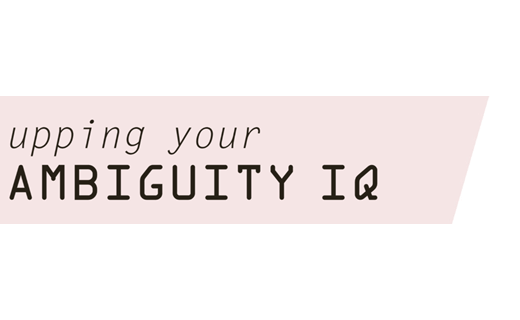- Candidates
- Login
- Set Up Account
- Create a Job Alert
- Search Tools
- Resources
- Employers

THERE IS THAT QUOTE OUT THERE about nothing being certain but death and taxes! Which implies that all else is uncertain; ambiguous. In the workplace, ambiguity runs rampant, sometimes for good reason and others unnecessarily. As a young professional getting comfortable with ambiguity can be exhausting. Many employers think today’s young professional isn’t equipped to handle ambiguity. Let’s challenge that!
WHAT IS AMBIGUITY?
By definition it is the quality of being open to more than one interpretation; inexactness. You can have ambiguity in the spoken or written word. It can be simple: David gave a ride to his daughter wearing a pink shirt. Was the daughter or David wearing the pink shirt? Or it can be more complex: we have this challenge and we could solve it this way or that. The fact is that ambiguity is all around us, so you have had the opportunity to deal with it. You may just not have recognized it as such.
WHY IS BEING ABLE TO HANDLE AMBIGUITY SO IMPORTANT?
We work and live in a changing and evolving world. Being able to adapt and learn the ‘new’ is so important. “The ability to be able to handle ambiguity is an important skill,” said Steve Bent, District Sales Lead for Corteva Agriscience Canada. “It is crucial to success of the individual, but also for the workplace.” Companies need people with the skills to adapt with changing ways of doing business, shared Bent. People with the skills to navigate ambiguity sometimes find new and more efficient ways to operate.
“Technology has changed the way we live and work as well as how quickly business strategies pivot,” said B.J. Warren, Employer Branding Lead for Bayer U.S. “Employees who thrive are those that can manage through change and that can move projects forward, even when all the answers are not yet clear.”
WHAT ARE YOUNG PROFESSIONALS GETTING WRONG WHEN IT COMES TO DEALING WITH AMBIGUITY?
There are a variety of employability skills that employers feel young professionals lack coming into the workplace, but ambiguity is consistently mentioned. “You will likely not always have all the answers, clear direction, and understand all the stakeholders when you start a project or initiative and they will likely change throughout the process,” said Warren. “Don’t let these challenges prohibit you from moving forward.”
It is easy to complain or to say you couldn’t do it because you didn’t have all the information, but those that utilize their networks and still move forward, come out on top, shared Warren. Bent echoed these sentiments saying that it is important for young professionals to be okay with not having an answer immediately to an ambiguous situation. In many cases there is no answer to the problem. “It’s about being comfortable with knowing a solution to a challenge or problem will present itself, in time,” said Bent.
HOW DO YOU BUILD YOUR AMBIGUITY IQ?
Employers continue to say that young professionals haven’t figured out ambiguity in the workplace. So, what can you do to build and grow in this skill? Warren recommends that you build your internal and external network. When you don’t have all the information, you can rely on your network to help you fill in the blanks.
“Identify coaches who can also assist you in identifying your own blind spots and weaknesses when it comes to working in a complex, evolving environment,” said Warren.
“Finally, find your resiliency. Learn what works best for you to work through change and to have a healthy work-life balance.” Bent suggests putting yourself in situations where you are out of your element and need to work through a challenging situation. He also shares that being inquisitive and asking questions can help build your ambiguity IQ. He stresses that great question asking skills are extremely important.
“In my opinion, it is a two-way street when it comes to working through ambiguity,” said Bent. “The person assigning the task needs to create regular checkpoints to minimize the risk of misunderstanding. The person assigned to the task has the responsibility to ask for clarification when they are not sure about something.”
HOW DO YOU LOOK FOR THIS QUALITY IN CANDIDATES? HOW DO THEY DEMONSTRATE THEIR CAPABILITIES/EXPERIENCES TO YOU?
You do have experience with ambiguity. Perhaps you just haven’t found a way to articulate this in interviews. Bent shared that he typically asks interview questions around the thought process that someone has gone through when they have faced an ambiguous situation. What were the results and what did they learn.
“It isn’t so much what the outcome was, but rather how they dealt with the situation and what they learned,” said Bent. “Candidates who share specific examples of projects (whether from work or school) where they have been met with changes in deadlines, owners, scope, and more and then highlight how they managed through these changes demonstrates how they are able to manage ambiguity,” said Warren. “Candidates should avoid casting blame on anyone else and instead share what actions were taken to achieve a successful result.”
Ambiguity is about change and your adaptability to change. Another large component to handling ambiguity is problem-solving skills. Being able to analyze changing situations and identify ways to come to a resolution/action.
That is the thing with employability skills – many of them are intertwined. A lot of these skills will come with time but recognizing them now and finding ways to practice and communicate about them will really UP your IQ, particularly when it comes to ambiguity!